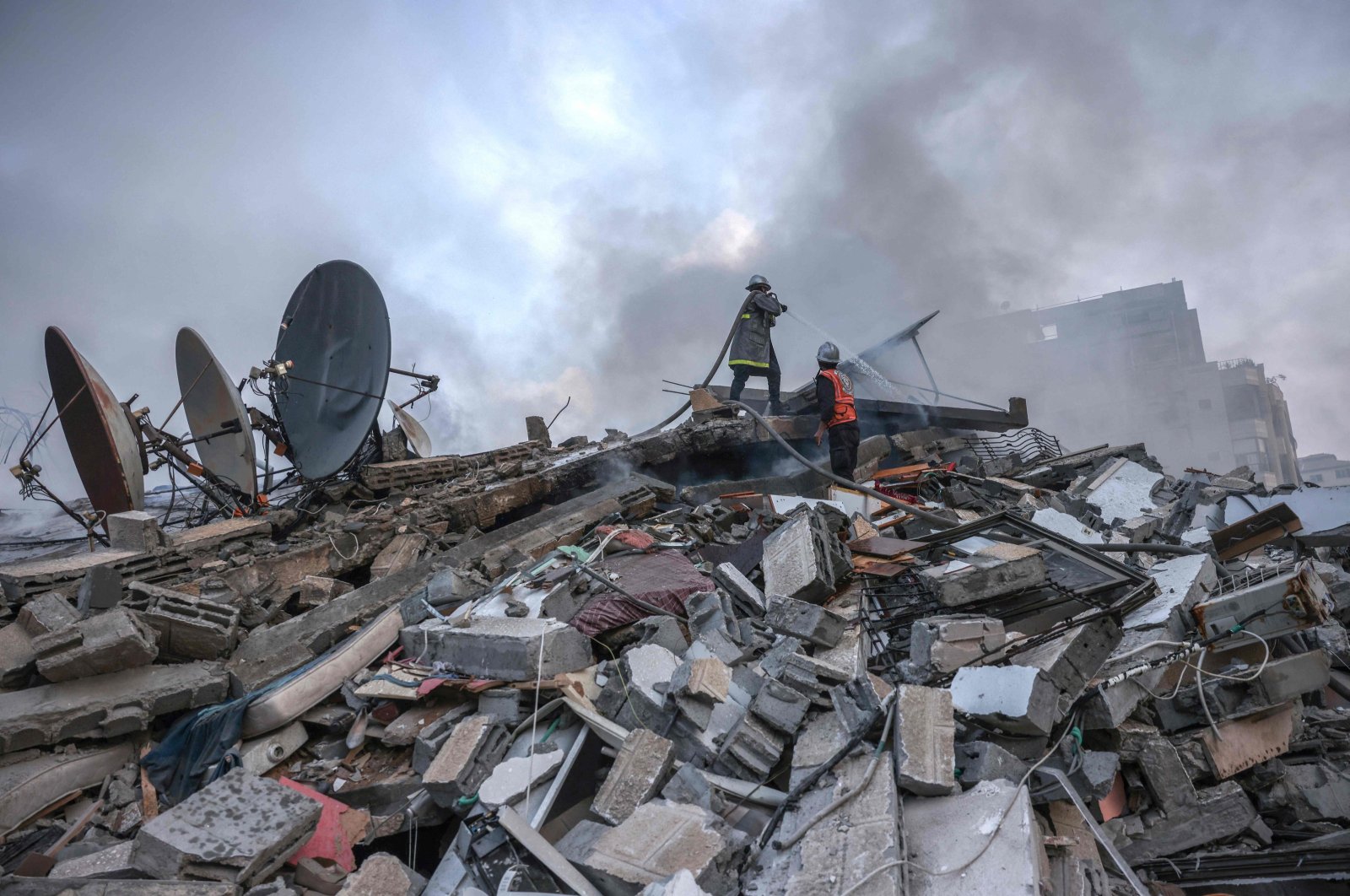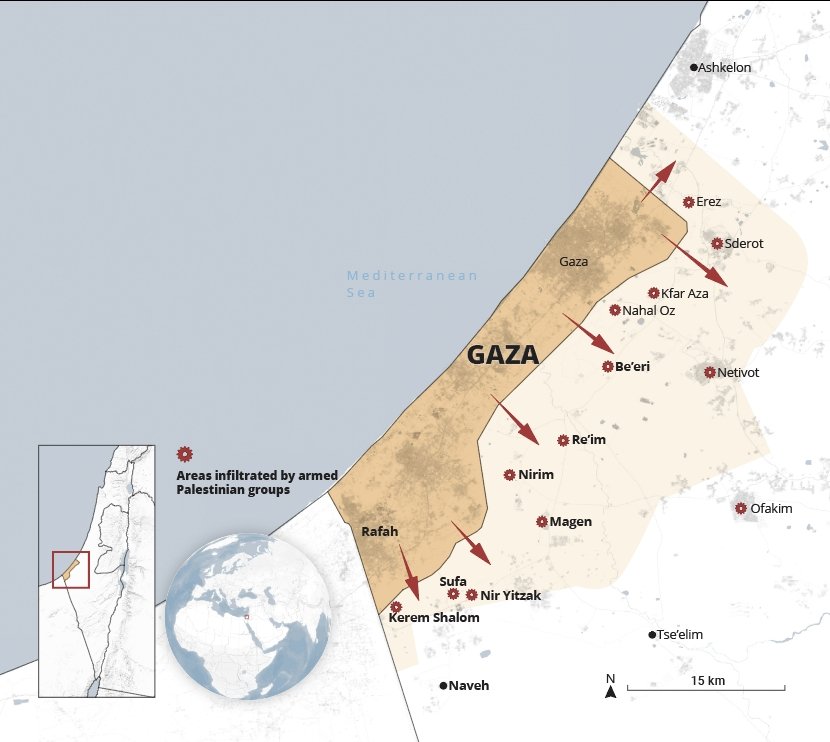
Israeli airstrikes hit housing blocks, a mosque and homes in Gaza overnight, killing more than 300 people, including 20 children, as Benjamin Netanyahu vowed "mighty vengeance"
Israel battered Gaza on Sunday, a day after a surprise attack by Palestinian resistance group Hamas on Israeli towns, threatening a major new war in the Middle East.
In a sign the conflict could spread beyond Gaza, Israel and Lebanon's Iran-backed Hezbollah exchanged artillery and rocket fire, while in Alexandria, two Israeli tourists were shot dead along with their Egyptian guide.
Overnight, Israeli airstrikes had hit housing blocks, a mosque and homes of Hamas officials in Gaza, killing more than 300 people, including 20 children, as Prime Minister Benjamin Netanyahu vowed "mighty vengeance for this wicked day."
In southern Israel, armed Hamas members were still fighting Israeli security forces 24 hours after a surprise, multi-pronged assault during a rocket barrage smashed through security barriers and army bases into nearby towns.
Israel's military, which faces questions over its failure to prevent the attack, said it had regained control of most infiltration points, killed hundreds of attackers and taken dozens more prisoner but was still fighting in some places.
It said it had deployed tens of thousands of soldiers in the area surrounding Gaza, a narrow strip that is home to 2.3 million Palestinians, and planned to evacuate all Israelis living around the frontier of the territory.
"We're going to be attacking Hamas severely and this is going to be a long, long haul," a military spokesman told a briefing with reporters.

In Gaza, Hamas spokesman Abdel-Latif al-Qanoua said the attack had been "in defense of our people," adding the group's fighters continued rocket strikes and were still conducting operations behind the lines.
The attack represented the biggest and deadliest incursion into Israel since Egypt and Syria launched a sudden assault in an effort to reclaim lost territory in the Yom Kippur war 50 years ago.
The conflict could undermine U.S.-backed moves toward normalizing relations between Israel and Saudi Arabia – a security realignment that could threaten Palestinian hopes of self determination and hem in Hamas's main backer, Iran.
Tehran's other main regional ally, Lebanon's Hezbollah, fought a war with Israel in 2006 and tensions have regularly flared since. "We recommend Hezbollah not to come into this and I don't think they will," Israel's army spokesperson said.
Hamas fired more rocket salvoes into Israel on Sunday, with air raid sirens sounding across the south, and the Israeli military said it would combine an evacuation of border areas with a search for more gunmen.
Netanyahu's office said his security cabinet had approved steps to destroy "for many years," the military and governmental capabilities of Hamas and Islamic Jihad, another militant group that has said it is also holding captives, including cutting electricity, fuel supplies and the entry of goods into Gaza.
Gaza destruction
Israeli air strikes on Gaza began soon after the Hamas attack and continued overnight and into Sunday, destroying the group's offices and training camps, but also houses and other buildings. Hamas said Israel had cut off water to some areas.
Palestinian health officials said 313 people had been killed in Gaza and nearly 2,000 wounded in the retaliatory strikes.
Black smoke, orange flashes and sparks lit the sky from explosions. Israeli drones could be heard overhead. Unlike in some previous rounds of strikes, Israel's military did not give advance warning of strikes on residential buildings.
In a refugee camp in central Gaza, neighbors removed rubble to retrieve the bodies of seven people from one family, including five children, whose house had been bombed.
In Khan Younis, in southern Gaza, people searched through the remains of a mosque early on Sunday. "We ended the night prayers and suddenly the mosque was bombed. They terrorized the children, the elderly and women," said resident Ramez Hneideq.
The escalation comes against a backdrop of surging violence between Israel and Palestinian militants in the Israeli-occupied West Bank, where a Palestinian authority exercises limited self-rule.
Conditions in the West Bank have worsened under Netanyahu's hard-right government with more Israeli raids and assaults by Jewish settlers on Palestinian villages, and the Palestinian Authority called for an emergency Arab League meeting.
Peacemaking has been stalled for years and Israeli politics have been convulsed this year by internal wrangles over Netanyahu's plans to overhaul the judiciary.
Hamas leader Ismail Haniyeh said the assault that began in Gaza would spread to the West Bank and Jerusalem. Gazans have lived under an Israeli blockade for 16 years, since Hamas seized control of the territory in 2007.
In a speech, Haniyeh highlighted what he called threats to Jerusalem's Al-Aqsa Mosque, on a site that is also holy to Jews who know it as the Temple Mount, the continuation of Israel's blockade and Israeli normalization with countries in the region.
"How many times have we warned you that the Palestinian people have been living in refugee camps for 75 years, and you refuse to recognize the rights of our people?"
In the north, Lebanon's Hezbollah said in a statement it had carried out a rocket and artillery attack on three posts including a "radar site" in the Shebaa Farms, a slice of land occupied by Israel since 1967 that Lebanon claims.
Israel responded with artillery fire on southern Lebanon. There were no reports of casualties.
